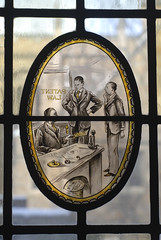
America Invents Act is latest bill in the US patent law system, aimed more at defending entrenched economic interests rather than anything else. The bill changes the method for determining the priority of patent applications to a “first to file” system from the long-standing “first to invent” method.
According to the NYTimes, the major two views about this bill are:
- “This bill is unequivocally a job killer,” said Valerie S. Gaydos, a Baltimore-based investor in early-stage companies. “It will create a rush to the patent office, with innovators seeking to file anything and everything. The applications will be less complete, less well written and it will create more of a backlog.”
- David S. Kappos, the patent office director and under secretary of commerce for intellectual property, disagreed, saying that the first-to-invent system was flawed because it essentially granted an inventor the right to legally defend his contention that he came up with an idea first. By changing to a first-to-file system, which is used in nearly every other country around the world, priority is clearly established, he said.
Many large corporations — like General Electric, Caterpillar and I.B.M. — supported the bill, which opponents suggested was evidence that the bill favors behemoths at the expense of the little guy. They point out that Mr. Kappos worked at I.B.M. for 27 years before taking the patent office job.
Anon
Boston
The Framers - at the urging of the Paris-based Thomas Jefferson - gave Congress the power "To promote the Progress of Science and useful Arts, by securing for limited Times to Authors and Inventors the exclusive Right to their respective Writings and Discoveries" (Art I Sec. 8). The idea was clearly to encourage individual innovators to commercialize their ideas, reap the rewards of their ingenuity, and teach others their inventions so they might be improved upon. But most of all, the hope was to bring the benefits of invention to the public, to agriculture and to industry. The cotton gin, the McCormack reaper, the telegraph, the electric lightbulb, and countless other inventions benefited both their inventors and the public in this way.
The patent system has degenerated into a big money corporate game. Most utility patents are trivial improvements on existing technologies, and rarely encompass the whole of the value of the product: a smartphone may incorporate hundreds of patented ideas. Patents are often issued on ideas that are already in the public domain, and it is extremely difficult to overturn an issued patent. Despite the high cost of prosecuting a patent, companies like Motorola, Apple and Microsoft file thousands of them each year, almost indiscriminately. The inventors get a modest award for each filing and a second if the patent is granted. And rather than being an incentive to innovation, they are trading cards in litigation.
Worse still, patents get abused by non-practicing patent holders (who often buy them cheaply) for barefaced extortion schemes that create no economic value and only serve to raise the price of technology products to consumers or keep valuable products off the market. The patent portfolio of the failed Nortel Networks had more value in bankruptcy than all the other assets of the company combined, in a cynical bidding war.
Jefferson must be spinning in his grave.
 |
| Court of Customs and Patent Appeals Reports (Patent Cases) in a large DC law library. |
Lafayette75
Paris
Be careful, folks, anything that tends to bigness also arrives at awfullness in America. It is an ineluctable destination in an America gone crazy over Bigness is Beautiful.
What market bigness does is this: It creates oligopolies where too many customers go chasing too few suppliers. This is already happening to the Interconnect Industry, which is why DSL-interconnect is so much more expensive than elsewhere.
Which means what? My take: It means that our right to interconnect is not universal but based upon companies cherrypicking markets according to the number of cherries the market will produce.
Which means inevitably that some people will have to go without, sooner or later. It is one of the reasons why rural Internet Interconnect is lagging in the US. I live a very tiny village in the boonies of France, and yet my interconnect cost is only $20 a month.
Why? Because the government decided that citizens had the right to be informed (by TV, Telecom, Telephony) and that right should come at the lowest possible cost. Beyond that, whatever content they wanted could be priced at whatever the market will bear.
This notion is lost in America, which takes pride in Large Numbers bounced around the media, reported in the NYT, that makes mouths water.
What a bunch of children. Money can't buy you happiness, but it should be able to buy you a decently priced interconnect ISP.
RAPIER
CITY OF ANGELS
It's really boils down to control and domination. The realm of patent abuse has gone off the charts. Patents are being used by too big corps to dominate and control large marketplaces and LIMIT choices and increase costs to consumers thereby increasing their profits. Frenzied patent activity is occurring in every market; genetically modified food (and seeds), bio-med, etc. It's just another method to noose consumers with technology.
Farmers can't get a pineapple seed without buying a patented one from a giant Japanese firm because they GMOed it so now they own all the pineapple seeds.
Most of these corps don't create anything new. They just suck up other entrepreneurs' and inventors' ideas or products and/or steal them. A smaller entity or an individual has no chance to fight them in court. What are these patent vampires really producing that is truly beneficial to society at large? Drone jobs? Disposable technology to contaminate the planet further? Too rich executives? Contributing to an elite economic class and destroying the middle class? What is their true value to western civilization beyond Wall Street money changing and fostering a trend towards corporate state fascism?
Recently, congress was attempting to 'reform' the patent office filing from who had the idea first to who files first. Mammoth corporations employ mammoth law firms to do all that legwork. Tesla died poverty stricken. JP MORGAN bought or stole his ideas.
_______________
So, the present seems to favor a future characterized by economic monstrosities, also known, gingerly, as too big to fail.


3 comments:
...defeated was an amendment that would have stripped a provision from the bill that clarifies a method of calculating the deadline for applications to extend a patent. Senator Jeff Sessions, an Alabama Republican who sponsored the amendment, said that the change was actually meant to benefit a single company and its law firm, which might have missed such a deadline in 2001.
A third amendment, by Senator Maria Cantwell, a Washington Democrat, also was defeated. The amendment would have created a transitional program for consideration of business method patents.
The bill also contains a provision for an eight-year period of postgrant review of patents already issued. The measure was specifically aimed at so-called business method patents, which provide protection for a unique method of performing a task. The measure was heavily favored by the banking industry, which has been beset by patent infringement suits over things like electronic imaging of paper checks. The bill also provides a new method for challenges to be made to patent applications before a patent is granted.
Steve Bolger
New York, NY
There are more patent claims on things either obvious to people skilled in the art or insufficiently descriptive of the technology to teach how to make it work fueling this firestorm of litigation than anyone can count. The patent system is far more rewarding to lawyers than inventors.
achana
Wilmington, DE
Old trick, buy the patents and lock them away just in case the competition comes up with something similar. Microsoft does the same, Google is just being defensive with its Android move. You guys want to read up on Bio-prospecting?
USA manufactures more lawyers than scientists and engineers together. Who said our manufacturing industry has been taken over by the Chinese, the Japanese, the Indians, the (addPetPeeveHere)... Let's blame them, easier like that.
wondering
fiji
This is a sad turn of events. Most patents are generated by painstaking efforts in research and development. With so many companies having practically decimated their R&D departments in search of short term profits, we are now at the mercy of lawyers and MBAs fighting legal battles instead of real scientific and technological investments in the future.
sk4520
Palo Alto, CA
Of course!! Patents are extremely valuable and represent tremendous effort on part of inventors to research, articulate and defend them. Now hopefully VCs and investors will finally wake up and focus on young companies who have invested in IP and patents- rather than on ephemeral product/marketing machines.
[As to the eternal question of why patents-- well- without patents, there would be no incentive for anyone innovate-- people would just wait for someone else to come up with an idea so they could just sit back and rip them off. ]
Me
Charlottesville, VA
Hmmm. Lawyers are bad, China is lucky not to have them seems to be what most people are saying. Wonder what all the political prisoners in China would have to say about that, maybe they could have used a few more lawyers in China? Many of the problems with are patent system is an understaffed patent office (yup, let's cut the government) which approves just about anything and changes allowing Business Methods and Software to be patented (thanks to industry lobbying) so instead of blaming lawyers how about blaming the system that we all voted for?
CWH
Huntington, NY
Half the problem in the United states is that we do not manufacture anything, we just patent it to make a fortune. From mouse click through to the letter "i", nobody can make anything because company x has patented it and therefore you are now paying "protection" (I mean patent) money to MEGA COMPANY G.
rtfurman
Weston, MO
The rules changed many years ago. I was an inventor while working for a large defense related corporation (but not on the defense side) only to see a product I actually developed and put into the field have a patent slide under us by the large, long-established computer company. Their claim was broad and general and existed only on paper, while ours (mine) was a real actual working product! Though we had in fact made "patent application", this large defense related corporation chose not to spend the money to challenge.
So here we are today where the "first in the door" is the winner, and most of these "inventions" really don't exist.
Years ago, you were required to file with your patent application a working model of your device. I guess devices have gone the way of buggy whips. I wonder if the rights to buggy whips is still valid, but I guess someone has already bought the rights and is just waiting to sue for royalties. Oh well, just bring me my willow switch!
as
new york
We hear so much about high wages in the US causing our lack of competitiveness and so little about the legal system. After my experience in California I would consider any businessman who opened a labor intensive business in the US out of his mind. Not because of the wages but because hiring employees means inviting lawyers in to run ones business for their benefit. This is true in medical care as well. Obama care, for example, represents the best efforts of 4000 lawyer lobbyists advising 400 lawyer congressman and 100 lawyer senators and the one thing it is certain to do is increase the cut of medical care lawyers take. Our only salvation would be if we could export Harvard Law School to China and get China to sign on to our legal system.
Post a Comment